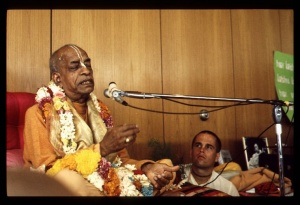CC Madhya 6.48 (1975): Difference between revisions
(Vanibot #0027: CCMirror - Mirror CC's 1996 edition to form a basis for 1975) |
(Vanibot #0020: VersionCompareLinker - added a link to the Version Compare feature) |
||
| Line 2: | Line 2: | ||
<div style="float:left">'''[[Sri Caitanya-caritamrta (1975)|Śrī Caitanya-caritāmṛta (1975)]] - [[CC Madhya (1975)|Madhya-līlā]] - [[CC Madhya 6 (1975)|Chapter 6: The Liberation of Sārvabhauma Bhaṭṭācārya]]'''</div> | <div style="float:left">'''[[Sri Caitanya-caritamrta (1975)|Śrī Caitanya-caritāmṛta (1975)]] - [[CC Madhya (1975)|Madhya-līlā]] - [[CC Madhya 6 (1975)|Chapter 6: The Liberation of Sārvabhauma Bhaṭṭācārya]]'''</div> | ||
<div style="float:right">[[File:Go-previous.png|link=CC Madhya 6.47 (1975)|Madhya-līlā 6.47]] '''[[CC Madhya 6.47 (1975)|Madhya-līlā 6.47]] - [[CC Madhya 6.49 (1975)|Madhya-līlā 6.49]]''' [[File:Go-next.png|link=CC Madhya 6.49 (1975)|Madhya-līlā 6.49]]</div> | <div style="float:right">[[File:Go-previous.png|link=CC Madhya 6.47 (1975)|Madhya-līlā 6.47]] '''[[CC Madhya 6.47 (1975)|Madhya-līlā 6.47]] - [[CC Madhya 6.49 (1975)|Madhya-līlā 6.49]]''' [[File:Go-next.png|link=CC Madhya 6.49 (1975)|Madhya-līlā 6.49]]</div> | ||
{{CompareVersions|CC|Madhya 6.48|CC 1975|CC 1996}} | |||
{{RandomImage}} | {{RandomImage}} | ||
==== TEXT 48 ==== | ==== TEXT 48 ==== | ||
<div class="verse"> | <div class="verse"> | ||
: | :'namo nārāyaṇāya' bali' namaskāra kaila | ||
: | :'kṛṣṇe matir astu' bali' gosāñi kahila | ||
</div> | </div> | ||
| Line 18: | Line 17: | ||
<div class="synonyms"> | <div class="synonyms"> | ||
namaḥ nārāyaṇāya—I offer my respects to Nārāyaṇa; | namaḥ nārāyaṇāya—I offer my respects to Nārāyaṇa; bali'-saying; namaskāra kaila—offered respects to Lord Caitanya Mahāprabhu; kṛṣṇe—unto Lord Kṛṣṇa; matiḥ astu—let there be attraction; bali'-saying; gosāñi—Śrī Caitanya Mahāprabhu; kahila—spoke. | ||
</div> | </div> | ||
| Line 25: | Line 24: | ||
<div class="translation"> | <div class="translation"> | ||
Offering his obeisances to Caitanya Mahāprabhu, Sārvabhauma Bhaṭṭācārya said, | Offering his obeisances to Caitanya Mahāprabhu, Sārvabhauma Bhaṭṭācārya said, "Namo nārāyaṇāya" ["I offer my obeisances to Nārāyaṇa"]." In return, Caitanya Mahāprabhu said, "Kṛṣṇe matir astu" ["Let your attention be on Kṛṣṇa"]." | ||
In return, Caitanya Mahāprabhu said, | |||
</div> | </div> | ||
| Line 34: | Line 31: | ||
<div class="purport"> | <div class="purport"> | ||
It is the etiquette among sannyāsīs, those on the fourth platform of spiritual life, to offer respects by saying oṁ namo nārāyaṇāya ( | It is the etiquette among sannyāsīs, those on the fourth platform of spiritual life, to offer respects by saying oṁ namo nārāyaṇāya ("I offer my respectful obeisances unto Nārāyaṇa"). This greeting is used especially by Māyāvādī sannyāsīs. According to the smṛti scriptures, a sannyāsī should not expect anything from anyone, nor should he consider himself identical with the Supreme Personality of Godhead. Vaiṣṇava sannyāsīs never think of themselves as being one with the Lord; they always consider themselves eternal servants of Kṛṣṇa, and they want to see everyone in the world become Kṛṣṇa conscious. For this reason, a Vaiṣṇava sannyāsī always offers his blessings to everyone, saying kṛṣṇe matir astu ("May you become Kṛṣṇa conscious"). | ||
</div> | </div> | ||
Latest revision as of 19:03, 27 January 2020

A.C. Bhaktivedanta Swami Prabhupada
TEXT 48
- 'namo nārāyaṇāya' bali' namaskāra kaila
- 'kṛṣṇe matir astu' bali' gosāñi kahila
SYNONYMS
namaḥ nārāyaṇāya—I offer my respects to Nārāyaṇa; bali'-saying; namaskāra kaila—offered respects to Lord Caitanya Mahāprabhu; kṛṣṇe—unto Lord Kṛṣṇa; matiḥ astu—let there be attraction; bali'-saying; gosāñi—Śrī Caitanya Mahāprabhu; kahila—spoke.
TRANSLATION
Offering his obeisances to Caitanya Mahāprabhu, Sārvabhauma Bhaṭṭācārya said, "Namo nārāyaṇāya" ["I offer my obeisances to Nārāyaṇa"]." In return, Caitanya Mahāprabhu said, "Kṛṣṇe matir astu" ["Let your attention be on Kṛṣṇa"]."
PURPORT
It is the etiquette among sannyāsīs, those on the fourth platform of spiritual life, to offer respects by saying oṁ namo nārāyaṇāya ("I offer my respectful obeisances unto Nārāyaṇa"). This greeting is used especially by Māyāvādī sannyāsīs. According to the smṛti scriptures, a sannyāsī should not expect anything from anyone, nor should he consider himself identical with the Supreme Personality of Godhead. Vaiṣṇava sannyāsīs never think of themselves as being one with the Lord; they always consider themselves eternal servants of Kṛṣṇa, and they want to see everyone in the world become Kṛṣṇa conscious. For this reason, a Vaiṣṇava sannyāsī always offers his blessings to everyone, saying kṛṣṇe matir astu ("May you become Kṛṣṇa conscious").